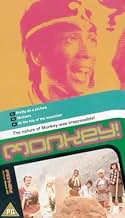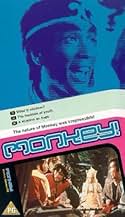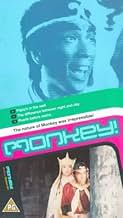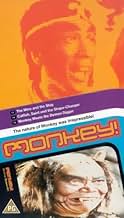Saiyûki
- Serie de TV
- 1978–2004
- 45min
Una adaptación de un cuento popular chino sobre una peregrinación a Occidente emprendida por un monje y sus guardianes divinos.Una adaptación de un cuento popular chino sobre una peregrinación a Occidente emprendida por un monje y sus guardianes divinos.Una adaptación de un cuento popular chino sobre una peregrinación a Occidente emprendida por un monje y sus guardianes divinos.
Argumento
¿Sabías que...?
- CuriosidadesOriginally transmitted in Japan as two series of 26 episodes, this was changed to three series of 13 episodes when transmitted in the UK. The final 13 episodes (the second half of series 2) were never translated into English, until Fabulours Films translated them for DVD release in 2002.
- Citas
[opening narration]
Narrator: In the worlds before Monkey, primal chaos reigned. Heaven sought order, but the phoenix can fly only when its feathers are grown. The four worlds formed again and yet again, as endless aeons wheeled and passed. Time and the pure essences of Heaven, the moisture of the Earth, the powers of the Sun and the Moon all worked upon a certain rock old as creation, and it magically became fertile. That first egg was named Thought. Tatagatha Buddha, the father Buddha said "With our thoughts, we make the world." Elemental forces caused the egg to hatch. From it then came a stone monkey... The nature of Monkey was irrepressible!
- ConexionesReferenced in Rupan sansei: Part II: Lupin's Big Saiyuuki (1979)
- Banda sonoraThe Birth of the Odyssey - Monkey Magic
Written by Mickie Yoshino, Yoko Narahashi and Yukihide Takekawa
Performed by Godiego
The story focusses on a small band of pilgrims travelling from China to India to fetch the holy scriptures. Leading the party is Tripitaka, a Buddhist priest and played by a girl, Masako Natsume. Following him is Monkey, Sandy and Pigsy. Apart from the priest, all are effectively spirits, cast out of heaven for causing mischief of various forms, and sworn to help the priest in his quest.
Now, the effects are cheesy, the acting is typically overacting, and the script of each episode typically has the band of pilgrims defeating some horde of demons in order to continue on their way. The demons are typically just actors with theatrically painted faces and occasionally horns and goofy teeth.
The English language version is fairly-well dubbed, and you get used to the voices not matching the lips straight off. Of interest to fans of the original LOTR animated movie is the fact that the voice of Pigsy was done by Peter Woodthorpe, who voiced Gollum in the animated film. The voices are virtually identical, except of course, Pigsy never goes on about "his Precious".
Monkey is the main star of the show, though, and has a number of magical powers at his disposal. His fighting staff can shrink or expand at his command (he often hides it in his ear!) and he can summon clouds to ride around on (which is just plain silliness, and brilliant anyhow!). I seem to recall he could also create duplicates of himself by plucking hairs from body.
Pigsy, as mentioned above, sounds just like Gollum, and is hedonism personified. He constantly craves women, food and alcohol to excess, though he rarely ends up satisfied.
Sandy is a fish spirit and is the only "heroic" character I can think of who goes around sporting a necklace of skulls.
Tripitaka is the priest who tries to keep them all under control. In reality, he only appears to have any direct control over Monkey, and he usually keeps the others in line.
In the second series, the actor playing Pigsy changed, though the voice remains the same. Also a new character appears in the form of Tripitaka's horse, which is apparently a dragon spirit (though he's a pretty cowardly dragon) called Yu-Lung.
The fight sequences are silly, and the weapons are very obviously rubber for the most part. But there is something about "Monkey" that transcends this and entertains you regardless of its technical failings. In the end, all the silliness just becomes part of the fun of the show and you watch it mainly for the interplay between the characters, not the plot or anything else.
- Rob_Taylor
- 29 dic 2002
- Enlace permanente
Selecciones populares
- How many seasons does Monkey have?Con tecnología de Alexa
Detalles
Contribuir a esta página






























